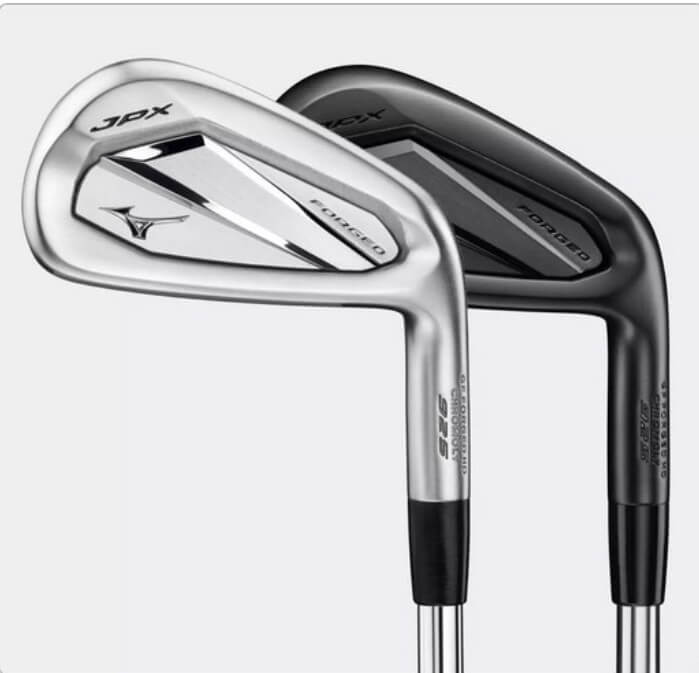- 1 Test Review: MIZUNO JPX 925 FORGED Irons
- 2 Mizuno JPX 925 Forged Iron: Complete Review and Buying Guide
- 3 Key Features and Technology
- 4 Technical Specifications
- 5 Performance Characteristics
- 6 Pros and Cons
- 7 Player Suitability
- 8 Distance Performance by Swing Speed
- 9 Shaft Options and Fitting
- 10 Comparison with Competitors
- 11 Manufacturing Excellence
- 12 Maintenance and Longevity
- 13 Value Proposition
- 14 Professional Reviews and Reception
- 15 Conclusion
- 16 Sources
Test Review: MIZUNO JPX 925 FORGED Irons

Today, I had the chance to test out a brand-new set of golf irons.
The test club was the MIZUNO JPX 925 FORGED 7-iron.
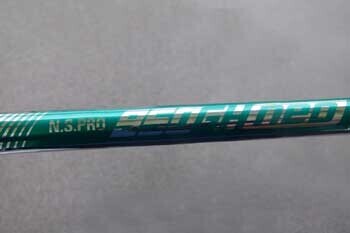
It was paired with the N.S.PRO 950GH neo shaft.
The specs are as follows: 30° loft, 37.25 inches in length, S flex, 98g shaft weight, 1.7 torque, D0 balance, and a butt-end kick point. The total club weight is 418g.

This is a sleek forged iron from Mizuno.
While Mizuno’s MP line often comes to mind first when talking about irons, the JPX series has also long been popular—and rightly so.
The JPX line is arguably more forgiving than the MP, but it doesn’t compromise on looks or quality.
If you prefer a classic, traditional feel, go for MP. But if you’re looking for more forgiveness and distance with modern technology, JPX might be your go-to.

It’s simple and stylish—exactly what you’d expect from Mizuno.
Looking closely, it’s evident that this is a shallow-faced iron.
Personally, I prefer higher-face irons for better compression, but many golfers out there love this shallow look. Especially those who swing level through the ball might find this shape more appealing.

The back face looks like it has an attached part.
I tend to prefer irons made from a single solid piece, but many golfers enjoy this multi-material, “composite” structure.
Each design delivers a unique feel. For me, the presence or absence of hollow cavities is more important than material mix. I’ve always preferred solid, non-hollow constructions.
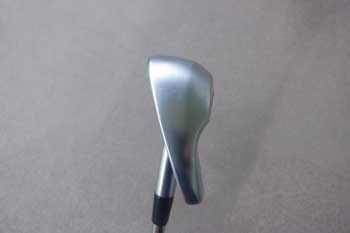
The bulging shape made me wonder if this was a hollow-body iron, but it might not be.
The shape is clean and smooth—not sharply contoured, but rather round and soft, giving off a sense of forgiveness.
Despite its easygoing design, it doesn’t feel cheap. The overall finish is excellent.

Looking at the depth of the cavity, it appears to be a half-cavity at first glance. However, if you were to remove the back insert, it could very well reveal a full cavity structure.
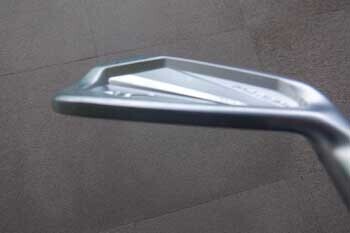
The top line seems a bit thick but still within what I would consider the standard range.

The sole is fairly standard in width, and you can clearly see that a lot of material has been ground off for better turf interaction.
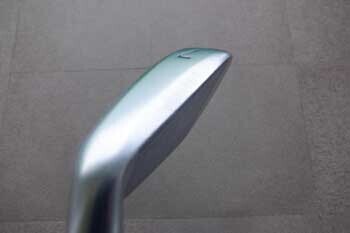

The leading edge is aggressively ground down, which is increasingly common in modern irons.
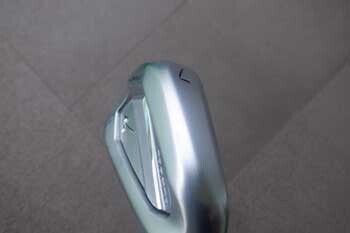
The trailing edge has also been significantly shaved down, further optimizing turf performance.

The neck length is standard—nothing out of the ordinary.

The hosel is engraved with “GF FORGED HD CHROMOLY 925”.
Mizuno is well known for its meticulous forging techniques and materials, and this iron is no exception.

The face doesn’t have any milling patterns.
Mizuno has traditionally used smooth face finishes for their irons.
While many modern irons feature face milling, Mizuno’s choice to go without may suggest it’s not as essential as some think.
Personally, I don’t find milling completely pointless, but I have yet to find one that truly reduces flyers the way I’d like.

The installed grip features the Mizuno logo and looks sharp.
Rather than being soft, it feels tacky and secure in the hands, which should work well even in wet conditions.

Practice swings felt decent overall.
Since it’s a lightweight model, I took extra time to get a feel for it during warm-up.
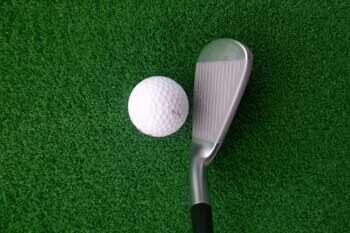
When I addressed the ball, I was a bit disappointed.
It wasn’t hard to set up to, but it didn’t have that “beautiful face” either.
The rounded design was just too prominent for my taste—I expected something sharper and sleeker, especially from Mizuno.
Perhaps this is just the JPX look? Are most recent JPX irons designed like this?
It’s been a while since I tested Mizuno irons, but honestly, this one looked a bit cheap, which was disappointing.

Now on to the actual hitting session.
The feel at impact was… just okay.
There was a certain “disconnect” between materials, or perhaps a slight hollow feeling.
Ball contact wasn’t particularly satisfying—the ball seemed to jump off the face quickly.
There was a noticeable gap between what I expected from the looks and the actual feel at impact.
This isn’t the plush forged feel I had hoped for, but honestly, that’s becoming more common these days.
Maybe my expectations for Mizuno irons were simply too high.

In terms of launch, it was average.
The iron didn’t feel overly demanding, and thanks to the well-designed sole, it seemed like it wouldn’t dig too much during real rounds.

Stability was quite impressive.
While it may look like a half-cavity, the actual forgiveness is more on par with a full cavity.
Many players will appreciate this level of playability.

Workability was also solid.
It was easy to shape shots both left and right.
The ball flight was quick off the face, giving it a “get it done fast” feel compared to traditional forged irons, with reduced hold time and tighter curves.
It’s a neutral and responsive club, reacting equally well to draws and fades.

As for distance performance—very strong.
The ball popped off the face with good speed and power.
That said, irons aren’t meant to chase distance like drivers. They’re for precision and control.
In my opinion, slower ball speeds often allow for better distance control, but many modern irons go in the opposite direction.
With this club’s strong face rebound, you’ll need to develop feel to dial in distance, which could be challenging for some.
Given the elegant look, I expected this to be a feel-focused iron, but it turned out to be a distance-oriented model that definitely packs a punch.
In today’s game, even irons are expected to produce more distance, and this one should be quite popular because of that.

One thing that hasn’t changed—Mizuno’s build quality is still top-notch.
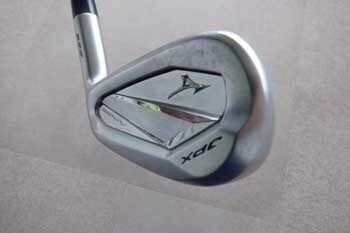
This club feels like a modern classic.
Mizuno sticks to a clear design philosophy, and every evolution builds logically from that foundation.

Mizuno irons have always been exceptional, but many brands today have caught up—raising the overall standard of the market.
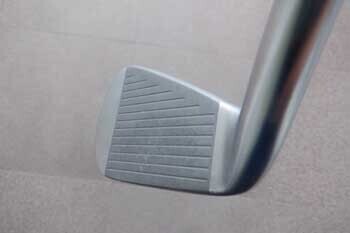
Still, I hope Mizuno continues to lead by example—staying true to its roots with unmatched craftsmanship and technicalexcellence.

Even though it’s packed with modern tech, the design doesn’t scream “high-tech”—a true testament to Mizuno’s refined aesthetic sense.

It was a meaningful and enjoyable experience to revisit Mizuno irons after such a long time.
*Addition: Introduction to this club (I researched this club after writing this article)
Mizuno JPX 925 Forged Iron: Complete Review and Buying Guide
The Mizuno JPX 925 Forged Iron represents what the manufacturer describes as “the most dramatic performance enhancement in the history of the JPX Forged line.” This revolutionary iron combines cutting-edge technology with Mizuno’s legendary forging craftsmanship to create what many consider the ultimate player’s distance iron. Built for golfers who demand precision, feel, and distance, the JPX 925 Forged delivers on all fronts while maintaining the iconic buttery feel that has made Mizuno synonymous with forged iron excellence.
Key Features and Technology
Grain Flow Forged HD Construction
The JPX 925 Forged utilizes Mizuno’s advanced Grain Flow Forged HD process, which creates a multi-material construction designed to optimize performance across the entire set. The long irons (4-7) feature a forged Chromoly 4120 face and neck paired with a 431 stainless steel back, allowing for maximum CORTECH design flexibility and greater control over center of gravity depth. This dual-material approach provides enhanced ball speed and launch characteristics while maintaining the workability expected from a forged iron.
Material Composition by Club
The engineering philosophy behind the JPX 925 Forged becomes evident in its material selection. The shorter irons (8-GW) are forged from 1025E Pure Select Mild Carbon Steel, ensuring precision, control, and that iconic buttery feel Mizuno is renowned for. This material choice provides superior feedback and control for approach shots and scoring clubs, where precision takes precedence over pure distance.
Triple Cut Sole Technology
The Triple Cut Sole is meticulously engineered to enhance turf interaction, providing players with greater versatility and playability across varying lies and conditions. This sole design reduces turf drag while maintaining stability through impact, making the club more forgiving on less-than-perfect strikes while preserving the shot-shaping capabilities that better players demand.
Technical Specifications
Loft and Lie Specifications
The JPX 925 Forged features a carefully calibrated loft matrix that balances distance with playability:
- 4-iron: 21° loft, 60.5° lie angle, 0.15″ offset, 38.75″ length
- 5-iron: 24° loft, 61° lie angle, 0.142″ offset, 38.25″ length
- 6-iron: 27° loft, 61.5° lie angle, 0.134″ offset, 37.75″ length
- 7-iron: 30° loft, 62° lie angle, 0.126″ offset, 37.25″ length
- 8-iron: 34° loft, 62.5° lie angle, 0.118″ offset, 36.75″ length
- 9-iron: 38° loft, 63° lie angle, 0.11″ offset, 36.25″ length
- PW: 43° loft, 63.5° lie angle, 0.102″ offset, 35.75″ length
- GW: 48° loft, 64° lie angle, 0.091″ offset, 35.5″ length
Design Philosophy
The loft matrix features a 30-degree 7-iron, which positions it in the players-distance category without being overly aggressive. Mizuno has strategically weakened the lofts on the 9-iron, pitching wedge, and gap wedge to improve gapping and ensure smooth transitions throughout the set. This approach prevents the distance gaps that can occur with overly strong lofts in the scoring clubs.
Performance Characteristics
Distance Performance
The JPX 925 Forged delivers impressive distance gains compared to traditional forged irons while maintaining the control and workability that defines the category. The multi-material construction and optimized center of gravity placement contribute to higher ball speeds and more efficient launch conditions across the entire set.
Feel and Feedback
The combination of forged construction and balanced weighting produces what Mizuno describes as “tour-preferred vibration and sound.” The feel varies slightly between the long and short irons due to the different materials used, but both provide excellent feedback that allows skilled players to understand the quality of their strikes instantly.
Forgiveness and Playability
While designed for better players, the JPX 925 Forged offers more forgiveness than traditional blade-style irons. The cavity-back design and optimized weighting provide stability on off-center hits while maintaining the shot-shaping capabilities that accomplished golfers demand.
Pros and Cons
Advantages
Superior Feel and Feedback: The forged construction provides exceptional feel and feedback, allowing players to understand the quality of their strikes and make adjustments accordingly.
Excellent Distance: The multi-material construction and optimized design deliver impressive distance gains without sacrificing control.
Workability: The club head design and weighting allow for precise shot shaping and trajectory control.
Premium Construction: Forged in Mizuno’s iconic facility in Hiroshima, Japan, where Mizuno irons have been produced since 1968.
Improved Turf Interaction: The Triple Cut Sole enhances performance from various lies and conditions.
Disadvantages
Limited Forgiveness: While more forgiving than blades, these irons still demand consistent ball-striking to achieve optimal performance.
Higher Skill Requirement: The enhanced feedback and workability characteristics may be overwhelming for higher handicap players.
Premium Price Point: The advanced construction and materials result in a higher price compared to game-improvement irons.
Smaller Sweet Spot: The compact head design offers a smaller margin for error compared to larger cavity-back irons.
Player Suitability
Ideal Golfers
The JPX 925 Forged is designed for golfers with specific skill levels and preferences:
Low to Mid Handicappers (0-15): Players who can consistently strike the ball well and appreciate enhanced feedback and control.
Shot Shapers: Golfers who want to work the ball and control trajectory with precision.
Feel-Oriented Players: Those who prioritize the tactile feedback and sound of forged construction.
Distance Seekers: Players who want more distance without sacrificing the characteristics of a forged iron.
Less Suitable Golfers
High Handicappers (20+): Players who need maximum forgiveness and assistance with ball-striking consistency.
Beginners: Those still developing fundamental swing mechanics would benefit more from game-improvement irons.
Distance-Only Focus: Players who prioritize maximum distance above all other characteristics.
Distance Performance by Swing Speed
Moderate Swing Speed (80-90 mph)
Players with moderate swing speeds will experience solid distance gains with the JPX 925 Forged, particularly in the long irons where the Chromoly 4120 face construction provides enhanced ball speed. The optimized launch conditions help maximize carry distance even with more modest swing speeds.
Above-Average Swing Speed (90-100 mph)
This swing speed range represents the sweet spot for the JPX 925 Forged. Players will experience optimal distance, trajectory, and control characteristics. The enhanced ball speed from the forged face construction becomes more pronounced at these speeds.
High Swing Speed (100+ mph)
Players with high swing speeds will maximize the distance potential of the JPX 925 Forged while maintaining the control and workability they demand. The forged construction provides the feedback necessary to manage the increased ball speed effectively.
Shaft Options and Fitting
Stock Shaft Options
The JPX 925 Forged offers an extensive range of shaft options to accommodate different swing characteristics and preferences. Stock options include various steel and graphite shafts from leading manufacturers, each designed to complement the iron’s performance characteristics.
Custom Fitting Importance
Given the precision-oriented nature of the JPX 925 Forged, professional fitting is strongly recommended. The extensive shaft options and adjustment capabilities allow for precise optimization of launch conditions, spin rates, and feel characteristics.
Comparison with Competitors
Versus Traditional Forged Irons
The JPX 925 Forged offers significantly more distance than traditional forged irons while maintaining similar feel and workability characteristics. The multi-material construction provides performance benefits that single-material forged irons cannot match.
Versus Game-Improvement Irons
While game-improvement irons offer more forgiveness, the JPX 925 Forged provides superior feel, feedback, and shot-shaping capabilities. The distance performance is competitive with many game-improvement models while offering enhanced control.
Manufacturing Excellence
Hiroshima Heritage
Each JPX 925 Forged iron is forged in Mizuno’s iconic facility in Hiroshima, Japan, where Mizuno irons have been produced since 1968. This facility represents the pinnacle of forging expertise and quality control in the golf industry.
Quality Control Standards
Mizuno’s manufacturing standards ensure consistent performance across all clubs in the set. The Grain Flow Forged HD process creates a consistent grain structure that enhances both performance and durability.
Maintenance and Longevity
Care Requirements
The forged construction requires appropriate care to maintain optimal performance and appearance. Regular cleaning and proper storage help preserve the club’s performance characteristics and aesthetic appeal.
Durability Expectations
The high-quality materials and construction methods ensure long-term durability. The forged construction actually improves with use, as the impact conditioning enhances the club’s performance characteristics over time.
Value Proposition
Investment Considerations
The JPX 925 Forged represents a significant investment in golf equipment, but the combination of performance, feel, and manufacturing quality justifies the premium price for suitable players. The enhanced distance and control capabilities can lead to improved scoring and greater enjoyment of the game.
Long-term Value
The superior construction and materials ensure that the JPX 925 Forged will provide years of excellent performance. The classic design and proven technology make these irons a sound long-term investment for serious golfers.
Professional Reviews and Reception
Industry Recognition
The JPX 925 Forged has received widespread praise from golf industry professionals and equipment reviewers. The combination of distance, feel, and workability has been consistently highlighted as exceptional for the players-distance category.
Player Feedback
Professional and amateur golfers have praised the JPX 925 Forged for its ability to deliver increased distance without sacrificing the characteristics they value in forged irons. The enhanced ball speed and improved launch conditions have been particularly well-received.
Conclusion
The Mizuno JPX 925 Forged Iron represents a significant advancement in forged iron technology, successfully combining the feel and workability that defines the category with the distance performance that modern golfers demand. The multi-material construction, advanced sole design, and precision manufacturing create an iron that satisfies the most demanding players while offering improved performance over traditional forged designs.
For golfers who can appreciate and utilize the enhanced feedback and control characteristics, the JPX 925 Forged offers exceptional value. The combination of Mizuno’s legendary forging expertise with cutting-edge technology creates an iron that sets new standards for the players-distance category.
The investment in JPX 925 Forged irons represents a commitment to precision, performance, and the pure enjoyment of well-struck iron shots. For the right player, these irons can provide years of exceptional performance and satisfaction, making them a worthy addition to any serious golfer’s equipment arsenal.
Sources
- Mizuno Golf Official Website – JPX925 Forged Product Page: https://mizunogolf.com/us/golf-clubs/jpx925-series/jpx925-forged/
- MyGolfSpy – Mizuno JPX 925 Forged Iron Analysis: https://mygolfspy.com/news-opinion/why-the-new-mizuno-jpx-925-forged-irons-confuse-me/
- Golfer Geeks – JPX 925 Forged Iron Review: https://golfergeeks.com/mizuno-jpx-925-forged-irons-review/
- TGW.com – Mizuno JPX 925 Forged Iron Specifications: https://www.tgw.com/p/mizuno-mens-jpx-925-forged-irons
- The Hacker’s Paradise – JPX 925 Forged Performance Analysis: https://www.thehackersparadise.com/mizuno-jpx-925-forged-irons/
Want to read the original article in Japanese? Click here
